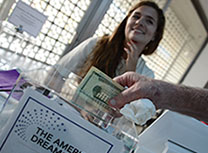Quackery and Medicine in 17th Century France

By A Noise Within
September 9, 2016
The Imaginary Invalid references many questionable antiquated medical practices. Learn more about the real-life history of “medicine” in 17th Century France:
“We are doctors come to warn you
Of the phonies out to harm you
Could your guru be a schmuck?
If it quacks, then it’s a duck!
Your guru scoffs at your queries,
And all his precious theories
Won’t stand up to some flack?
If it ducks, then it’s a quack!”
—Prologue, The Imaginary Invalid
“Quack, leave thy trade; thy dealings are not right, thou
tak’st our weighty gold, to give us light.”
—Francis Quarles, Hieroglyphikes of the Life of Man, 1638.
THE TERM “QUACK” refers to doctors who hawk fake remedies to patients and pretend to have special medical knowledge and skills they don’t possess. But why do we call them a “quack”? The word comes from the obsolete old Dutch word “quacksalver” (kwaksalver in modern Dutch), a combination of quack (to boast) and salve (an ointment). At first, the term just meant someone who cures with home remedies, but eventually came to mean someone who peddles phony cures and treatments. In English, the word was shortened to quack, which draws an amusing comparison to the other meaning of quack: the sound a duck makes. The squawking quacks of a duck and the hawking of useless cures of the quack doctor are equally ridiculous.
THE HUMORS
Although there were revolutionary anatomical discoveries being made throughout the 17th century, prevailing medical practices were still based on the theory of the Four Humors. The theory was that the human body contained and was controlled by four humors, or liquids: black bile, yellow bile, blood, and phlegm. Each humor corresponded to the elements (earth, fire, water, and air, respectively) and temperaments (melancholy, choleric, sanguine, phlegmatic). Thus, if a person was unhealthy, it was thought that their humors were out of balance, likely owing to an overabundance of one humor. To restore balance and health, the overly abundant humor should be let out of the body through practices like blood-letting, purging, and enemas.
ENEMAS, THE CLYSTER CRAZE
“The 17th century was the Golden Age of the enema, or clyster, as it was then called. The crude instruments of yesteryear—tubes of bone or wood attached to animal bladders or silk bags—were replaced by a formidable piston-&-cylinder device. An apothecary or doctor’s assistant, marching through the streets with a clyster tube on his shoulder, became a common sight, as a mania for enemas swept France. Fashionable Parisians, convinced that inner lavements purified the complexion and produced good health, took as many as three or four enemas a day. The craze was often burlesqued on the stage, notably by Molière, and it was a lively topic of elegant discourse in the salons. Louis XIV had over 2,000 enemas during his reign, sometimes holding court while the ceremony progressed. Aristocratic enemas were delicately tinted and scented. They were also so widely used as a means of poisoning that Louis XIV set up a special detective agency to combat the wave of enema-murders among his nobility.” (Excerpted from “The Clyster Craze” which originally appeared in Time magazine, July 1, 1946.)
WHAT WOULD PURGEON PRESCRIBE?
• For fevers, pains in the side, blood-spitting, pleurisy: Blood-letting
• Problems with the lungs: Blood-letting followed by four good purgings
• Toothache: Blood-letting, or take some Spirit of Nicotine
• The plague: Take some nutmeg. (Or, blood-letting.)
• For tooth extraction: “First boil, then reduce to ashes, some earthworms; fill the hollow tooth with this powder, seal it in with wax, and the tooth will soon fall out.”
• For pain in childbirth: Minimize the pain by placing the father’s hat on the woman’s belly.
• For all manner of falling evils: Take blood from the little finger of the sick man, and write the following lines, thenceforth to be worn as an amulet round his neck-“Jasper fert Mirrham, Thus Melchior, Balthazar aurum; Haec quicunque secum portat-tria nomina regum, Salvitur a morbo, Domini pietate, caduco.”








